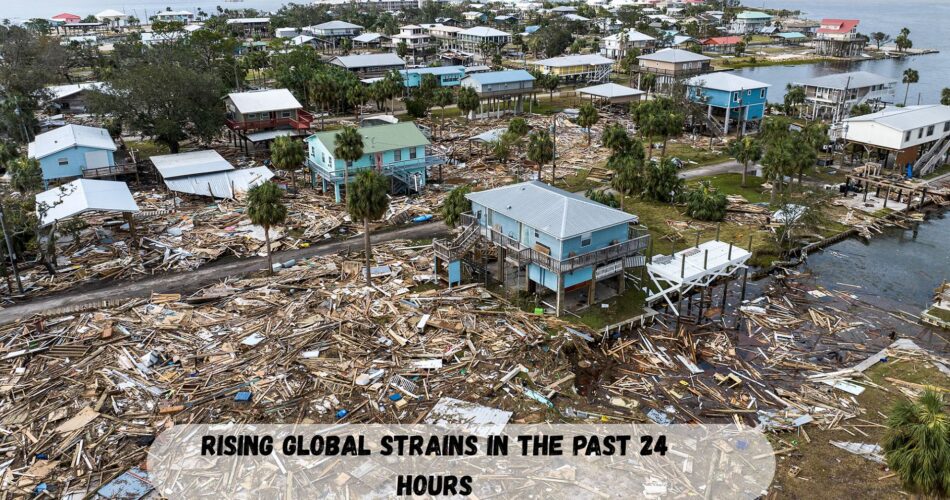In the last 24 hours, tensions have surged across Europe and the Middle East. Lithuania accused Russia of airspace violations, Washington issued stern warnings to both Israel and Hamas, Hungary sought to evade new U.S. sanctions, and the European Union postponed a major financial decision for Ukraine. The events highlight growing political and military friction among global powers.
- Russian Aircraft Breach Lithuanian Airspace
- Putin Warns Against Ukrainian Use of U.S. Missiles
- Hungary Seeks to Bypass U.S. Sanctions on Russian Energy
- Trump Warns Israel Against West Bank Annexation
- U.S. Calls for Hamas Exclusion from Gaza Governance
- U.S. Ends Trade Talks with Canada Over Tariff Dispute
- EU Delays €140 Billion Ukraine Loan Decision
- Conclusion: A Day of Mounting Global Friction
Russian Aircraft Breach Lithuanian Airspace
Lithuania’s Defense Ministry reported that two Russian aircraft entered Lithuanian airspace from the Kaliningrad region during what Moscow described as a refueling mission. The brief incursion prompted NATO fighter jets to patrol the Baltic region, underscoring growing concerns about airspace security along NATO’s eastern flank.
- Location: Lithuanian airspace near Kaliningrad
- Actors: Russian Air Force, Lithuanian Defense Ministry, NATO
- Response: NATO air patrols scrambled to ensure territorial protection
Lithuania, a NATO member since 2004, has frequently accused Russia of testing its air defenses. Moscow has denied intentional violations, claiming navigation or operational errors. However, the repeated incidents have raised alarm across Eastern Europe amid the ongoing war in Ukraine.
Putin Warns Against Ukrainian Use of U.S. Missiles
Russian President Vladimir Putin warned that if Ukraine used U.S.-supplied Tomahawk missiles, Russia would respond in a “very serious, if not overwhelming” manner. The statement came after reports that the United States was considering advanced weapon shipments to Kyiv.
Despite his warning, Putin also emphasized that Moscow remains open to dialogue with Washington, even after a planned U.S.–Russia summit was cancelled earlier this week. Analysts say this dual tone reflects the Kremlin’s attempt to project strength while avoiding complete diplomatic isolation.
Hungary Seeks to Bypass U.S. Sanctions on Russian Energy
Hungarian Prime Minister Viktor Orbán announced that his government is developing mechanisms to bypass new U.S. sanctions imposed on Russian oil and gas companies, including Lukoil and Rosneft.
Orbán, known for maintaining close ties with Moscow, said that Hungary’s energy security depends heavily on Russian imports. Budapest’s move risks increasing tensions with Washington and the European Union, both of which have pushed for stricter enforcement of sanctions against Russia.
Key Details:
| Sanctioned Entities | Impacted Sector | Hungary’s Response |
|---|---|---|
| Lukoil, Rosneft | Oil and gas | Bypass payment systems, secure direct deals |
| Financial restrictions | Banking, trade | Develop local alternatives to SWIFT |
Trump Warns Israel Against West Bank Annexation
U.S. President Donald Trump issued a sharp warning to Israel, saying it would lose American support if it proceeded with the annexation of the occupied West Bank. Trump added that he had assured Arab leaders during recent talks that no such move would take place.
This statement marks a significant shift in tone from Washington, which has traditionally supported Israel’s territorial policies. The warning also appears aimed at preserving U.S. relations with key Arab states, especially amid efforts to stabilize the Middle East following months of unrest in Gaza.
U.S. Calls for Hamas Exclusion from Gaza Governance
In related remarks, U.S. Secretary of State Marco Rubio declared that Hamas “cannot be involved in governing Gaza” and criticized the UN Relief and Works Agency (UNRWA), describing it as a “subsidiary of Hamas.” Rubio called for alternative mechanisms to manage humanitarian operations in Gaza after the ongoing ceasefire.
Washington’s position reflects a broader push to reshape Gaza’s post-war governance, though analysts warn that excluding Hamas entirely could complicate reconstruction efforts and deepen political instability in the enclave.
U.S. Ends Trade Talks with Canada Over Tariff Dispute
In another move, President Trump announced the termination of all trade negotiations with Canada, accusing Ottawa of attempting to influence the U.S. Supreme Court through a television advertisement opposing U.S. tariffs.
The U.S. and Canada have long been close economic partners under NAFTA and the USMCA, but trade tensions have risen over tariffs on steel, aluminum, and agricultural goods. Canada has not yet officially responded to Trump’s allegations.
EU Delays €140 Billion Ukraine Loan Decision
European Union leaders postponed a decision on a proposed €140 billion loan for Ukraine, which was to be financed using profits from frozen Russian assets. The delay followed legal and financial objections raised by Belgium, where many of the assets are held.
EU officials said the issue would be revisited in December 2025, giving the bloc more time to address concerns over international law and asset ownership rights.
EU Loan Plan Overview:
| Amount | Source of Funds | Purpose | Status |
|---|---|---|---|
| €140 billion | Frozen Russian assets | Support for Ukraine’s reconstruction and budget | Postponed until Dec 2025 |
Conclusion: A Day of Mounting Global Friction
From the skies over Lithuania to the corridors of Brussels and Washington, the past 24 hours revealed deepening geopolitical rifts. As Russia tests NATO’s defenses and global leaders clash over sanctions, aid, and alliances, diplomatic tensions continue to rise.
Analysts warn that without renewed dialogue and restraint, Europe and the Middle East could face further instability heading into 2026.

